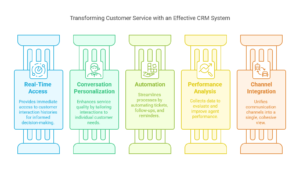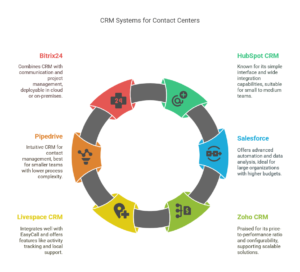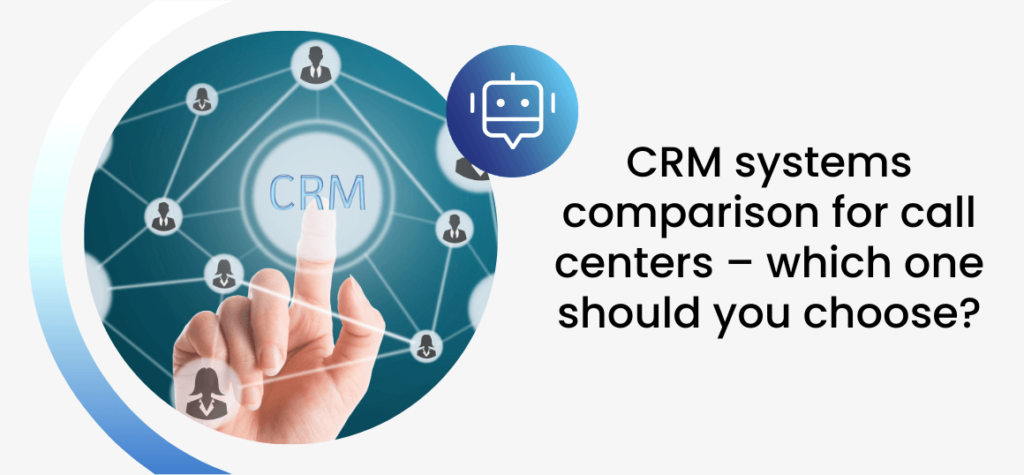How to choose the ideal CRM system for a call center? A review of the most popular solutions
A well-functioning call center today is not just about efficiently answering calls. It’s primarily about quick access to information, personalized conversations, and seamless service across multiple communication channels. Without the right CRM system, these goals are virtually unattainable. The CRM is the command center for customer relationships – it connects data, automates processes, and supports the team in their daily tasks.
However, the market offers dozens of CRM systems, varying in functionality, implementation models, levels of integration with call center systems, and flexibility of configuration. So how do you choose the solution best suited to your team’s needs?
Implementing a CRM system – the most important step in digital transformation
CRM (Customer Relationship Management) is a system designed to manage customer relationships. In the case of call centers, the CRM plays a particularly crucial role as it:
- provides real-time access to the full history of customer interactions;
- supports conversation personalization and improves service quality;
- enables automation of tickets, follow-ups, and reminders;
- collects data needed to analyze agent performance;
- integrates communication channels – phone, chat, email – into a single view.
The lack of a proper CRM or reliance on outdated solutions leads to inefficiency, service errors, and lower customer satisfaction (CX).

Choosing a CRM system for a call center – 6 key criteria that matter
Selecting a CRM system for a call center is a decision that directly impacts the efficiency of the entire organization. It’s not just about a list of features, but about whether the solution actually supports real-life processes. A CRM must be fast, intuitive, well-integrated with the phone system, and flexible – only then will it streamline work rather than hinder it. Below, we discuss the specific aspects to focus on in order to choose a tool that truly works in a call center environment:
- Integration with the call center system and phone infrastructure (including virtual PBX) – The CRM should seamlessly integrate with call center software, allowing for screen pop-ups displaying customer data during calls, call recording, contact logging, and agent activity reporting.
- Automation features – Automated reminders, follow-up campaigns, customer segmentation, and ticket prioritization significantly improve the daily workflow of consultants.
- Support for multiple communication channels (omnichannel) – A modern call center goes beyond phone calls. A good CRM should record interactions from various sources – phones, emails, chats, social media – and present them in a single, unified view.
- Reporting and data analysis – An intuitive analytics dashboard, the ability to generate KPI reports, and monitoring metrics like FCR (First Call Resolution), CSAT (Customer Satisfaction), and AHT (Average Handling Time) are essential for team management and process optimization.
- Customization to organizational needs – The more flexible the configuration of fields, views, and workflows, the better the CRM can adapt to your company’s specific nature and the types of tickets it handles.
- Security and GDPR compliance – The system should meet legal requirements regarding personal data protection, especially when handling a large number of customer contacts.
Examples of CRM systems in contact centers – functional analysis and fit for purpose
There are many CRM systems available on the market, but not all of them are suitable for the call center environment, which has its own specific demands – a fast-paced workflow, the need for instant access to data, and integration with a phone system. Choosing the right solution should be based not only on brand reputation or the number of features but above all on how well a specific tool supports daily customer service processes, reporting, automation, and team management. Below is a functional overview of some of the most popular CRM systems:
- HubSpot CRM
A popular freemium solution, praised for its simple interface and wide integration capabilities. It’s well-suited for small and medium-sized teams. The free version offers basic customer segmentation, contact and call tracking, but more advanced omnichannel and automation features are available in paid plans.
- Salesforce
One of the most comprehensive and flexible enterprise-grade solutions. It offers advanced automation modules, data analysis, sales funnel management, and full integration with tools like EasyCall Contact Center. It performs exceptionally well in large organizations but requires specialized implementation and a higher budget.
- Zoho CRM
Highly regarded by users for its price-to-performance ratio and high configurability. It offers automation features for sales and customer service processes, integration with phone systems, and support for multiple communication channels. It’s particularly well-suited for companies seeking a scalable solution that grows with the organization.

- Livespace CRM
A Polish solution originally designed for sales teams, increasingly adopted by call centers. Livespace integrates well with EasyCall and offers useful features like customer activity tracking, task reminders, and consultant performance analysis. It’s a great choice for teams that need a clear, user-friendly system with local (Polish) support.
- Pipedrive
A simple, intuitive CRM built for sales, but it can also be successfully used in call centers for contact management and activity tracking. It offers integration with popular phone systems, basic automation, and notification features. It works best for smaller teams with lower process complexity.
- Bitrix24
An all-in-one solution that combines CRM, communication tools, project management, and HR features. For call centers, the most important functionalities are VoIP telephony, call logging, outbound campaign management, and ticket handling. It can be deployed either in the cloud or on-premises, which is often important from a data security policy standpoint.
CRM integration with EasyCall: a new level of service and customer relations
The EasyCall system offers an open API and ready-made integrations with many popular CRMs, including Salesforce, Zoho, Livespace, HubSpot, and Pipedrive. This integration allows for full synchronization of customer information, contact history, case statuses, and planned follow-up actions. When a consultant receives a call, they have instant access to the client’s profile – including previous conversations, notes, tickets, and open tasks – significantly reducing service time and increasing accuracy.
Thanks to EasyCall’s CRM integration, you can also fully leverage contact automation features – for example, a voicebot or IVR system can use CRM data to inform customers about the status of their case, remind them of outstanding payments, or deliver personalized messages. The click-to-call feature allows consultants to make calls directly from the CRM system without manually dialing numbers, saving time and simplifying activity reporting.
An additional benefit is integrated reporting – data from the EasyCall system and the CRM can be analyzed together, providing a more complete picture of the team’s performance: number of calls, their quality, handling time, campaign effectiveness, number of resolved cases, and sales conversions. This enables managers to make better operational decisions with access to comprehensive reports from a single source.
EasyCall for telemarketing – what should your company check before choosing CRM software?
There is no one-size-fits-all CRM perfect for every business. The right solution should depend on the scale of operations, customer service model, number of consultants, complexity of business processes, and available budget.
The best CRM is one that:
- integrates seamlessly with the call center system;
- simplifies consultants’ daily tasks;
- collects and organizes customer data;
- enables performance analysis and data-driven decision-making;
- is flexible, secure, and scalable.
If you’re looking for a solution that will allow your company to fully unlock its potential and combine customer data with the functionality of a modern contact center – explore EasyCall’s CRM integrations. Book a free consultation with our experts today and see how technology can drive your team’s success.



